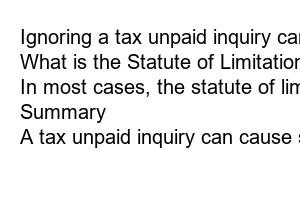세금미납조회
Are you worried about an unpaid tax bill? Have you received a tax unpaid inquiry from the IRS? If so, you’re not alone. Many people find themselves in this situation, and it can be a stressful and overwhelming experience. But understanding the inquiry process and your options can help alleviate some of that stress.
What is a Tax Unpaid Inquiry?
A tax unpaid inquiry is a notification from the IRS that you have an outstanding tax debt. This inquiry will inform you of the amount you owe, including any interest and penalties, and give you a deadline to pay. Failure to address this inquiry can lead to more severe actions from the IRS, such as wage garnishment, bank levy, and even seizure of property.
How Does the IRS Conduct a Tax Unpaid Inquiry?
The IRS may initiate a tax unpaid inquiry in various ways, including:
• Automated notices generated by their systems
• In-person audits
• Correspondence audits
• Phone calls
Once the IRS notifies you of an unpaid tax debt, they will continue to contact you until the bill is resolved.
What are Your Options when Faced with a Tax Unpaid Inquiry?
When dealing with a tax unpaid inquiry, you have several options to resolve the debt. These include:
1. Paying the debt in full: If you have the funds to pay your tax bill in full, doing so is the easiest and quickest way to resolve your inquiry.
2. Installment Agreement: If you cannot pay the bill in full, you may request an Installment Agreement, allowing you to make monthly payments over time.
3. Offer in Compromise: If you cannot afford to pay the tax debt in full or through an Installment Agreement, you may qualify for an Offer in Compromise, which allows you to settle your debt for less than the full amount owed.
4. Currently Not Collectible: If you are experiencing a financial hardship, you may qualify for a Currently Not Collectible status, which will temporarily halt IRS collection actions.
5. Innocent Spouse Relief: If you were unaware of your spouse’s tax debt, you may qualify for Innocent Spouse Relief, releasing you from liability for the debt.
6. Appeal: If you disagree with the IRS’s findings or have evidence that disputes their assessment, you may appeal the inquiry.
What Happens if you Ignore a Tax Unpaid Inquiry?
Ignoring a tax unpaid inquiry can result in harsh financial consequences. Not only will interest and penalties accrue, but the IRS can also initiate collection actions such as wage garnishment, bank levy and even seizing property.
What is the Statute of Limitations for a Tax Unpaid Inquiry?
In most cases, the statute of limitations for the IRS to collect on a tax debt is ten years from the date you filed your tax return. However, there are some exceptions that could extend or shorten this period.
Summary
A tax unpaid inquiry can cause significant stress and anxiety, but understanding how the process works and your options can help you alleviate some of that stress. Your options include paying the debt in full, setting up an installment agreement, filing an Offer in Compromise or Currently Not Collectible request, or requesting Innocent Spouse Relief. Ignoring a tax unpaid inquiry can lead to wage garnishment, bank levies, and property seizures. The statute of limitations for the IRS to collect on a tax debt is generally ten years but may vary based on individual circumstances.

